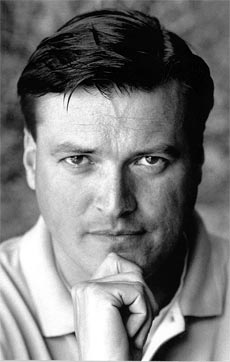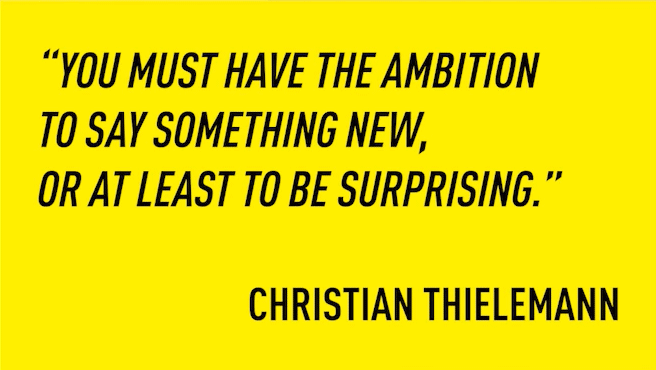Christian Thielemann

Thielemann began his professional career in 1978 as a rehearsal pianist at the Deutsche Oper in Berlin. Following positions in Gelsenkirchen, Karlsruhe and Hanover he joined the conducting staff of the Rhine Opera in Dusseldorf in 1985. Three years later he moved to Nuremberg to become Germany’s youngest Generalmusikdirektor before returning to the Deutsche Oper in his hometown of Berlin in 1997, holding the position of Music Director for seven years. More recently Thielemann led the Munich Philharmonic Orchestra from 2004 to 2011. In addition to his current position in Dresden, Thielemann was appointed Artistic Director of the Salzburg Easter Festival in 2013, the same year in which the Staatskapelle became the festival’s resident orchestra.
“When I need my Bayreuth ears, I have to cut my normal ears off, and then someone puts the new ears on,” said Mr. Thielemann, who tends to speak poetically. “At the end of the summer, the new ears are cut off, and then I have my old ears back.” (Christian Thielemann in The New York Times)
Christian Thielemann maintains close links with both the Berlin and Vienna Philharmonic Orchestras. He has also been a leading light at the Bayreuth Festival since his debut there in the summer of 2000 with Wagner’s Meistersinger, returning year after year to thrill audiences with benchmark interpretations. From June 2015 he has also been Music Director of the festival.
Thielemann is a popular guest at the Salzburg Summer Festival. For his work on Strauss’s Die Frau ohne Schatten at the 2011 festival he was voted Conductor of the Year by Opernwelt magazine. In great demand as a versatile concert conductor, he has collaborated with the top orchestras of Amsterdam, London, New York, Chicago and Philadelphia, as well as performing in Israel, Japan and China.

Thielemann has a comprehensive catalogue of recordings. In addition to the New Year’s Eve Concerts from 2010 to 2013, he and the Staatskapelle have already recorded numerous symphonic works by Beethoven, Liszt, Brahms, Bruckner, Reger, Pfitzner and Busoni as well as Ariadne auf Naxos by Richard Strauss and Richard Wagner’s Parsifal for CD and DVD. Their most recent release is a complete cycle of Brahms’ symphonies. Together with the Vienna Philharmonic he has recorded all of Beethoven’s symphonies for CD and DVD.
Christian Thielemann is an honorary member of the Royal Academy of Music in London and holds honorary doctorates from the Franz Liszt College of Music in Weimar and the Catholic University of Leuven, Belgium. In May 2015 he was awarded the Richard Wagner prize by the Richard Wagner Society of the city of Leipzig.
General Music Director of Staatsoper Unter den Linden and the Staatskapelle Berlin
Starting from September 1, 2024, Christian Thielemann will assume the role of General Music Director at the Staatsoper Unter den Linden and the Staatskapelle Berlin.
Daniel Barenboim has shared his thoughts on Christian Thielemann's appointment:
“I have known Christian Thielemann since he was a 19-year-old young man, working as my assistant at the Deutsche Oper. Even then, his extraordinary musical talent was evident, and since then, he has become one of the outstanding conductors of our time. I am delighted that he will now take over the musical direction of the Staatsoper Unter den Linden and the Staatskapelle Berlin as General Music Director. I have been at the helm of these very special musical institutions for over thirty years, and I am confident that under Christian Thielemann's leadership, they will continue to maintain and expand their exceptional position in the Berlin and international music scene. I wish Christian Thielemann and the future Intendant Elisabeth Sobotka a fruitful and committed exchange, as well as the necessary luck and skill in running the house. I am eagerly looking forward to what lies ahead!”
Christian Thielemann on his friendship with Daniel Barenboim
(translated excerpt from an interview in Welt)
Döpfner: How long have you known each other?
Thielemann: Oh, at the concert where I filled in for him at the Philharmonie last year, we realized that we've known each other for 42 years. That's quite something. I told him, "You're part of my musical foundation. I used to listen to you at the piano evenings organized by Konzertdirektion Adler, which my parents took me to. I never thought I would actually meet you."
Döpfner: How did that first encounter go?
Thielemann: It was when I played the piano for his Tristan production at the Deutsche Oper. It's the story of the Tristan that was played from memory, a story he still tells everyone today. It happened like this: the singers were on the rehearsal stage, he was at the table conducting, and I was at the piano. Before staging a scene, you often have a purely musical rehearsal. So, I started playing without looking at the piano score. At some point, I noticed he was looking at me. Eventually, he asked, "Are you playing that from memory?" And I said, "Yes." Then he asked, "Can you play the whole piece?" I said, "Well, I think so." And so, I played most of the rehearsals from memory. After that, he took a liking to me. It was true love.
Döpfner: But you don't have a photographic memory, do you?
Thielemann: I have a purely intuitive memory, but I know where the important parts are.
Döpfner: But you have perfect pitch?
Thielemann: Yes, I got that from my father. I hear a tone and can immediately tell you what it is. (A cell phone makes a random sound) That was an H, for example.
Anyway, he took me with him as his assistant to Bayreuth. He brought me to Bayreuth!
Döpfner: When was that?
Thielemann: That was in 1981...
Döpfner: ...long before he conducted his Bayreuth Ring in 1988.
Thielemann: Yes, in 1988, I had already stopped being an assistant because I was conducting myself. But I spent three years in Bayreuth as his assistant. That meant conducting the stage music and being present at all rehearsals. It was quite exhausting. But during that time, we got along very, very well. Some of the preparations for the Bayreuth Tristan took place in Paris. So, I went to Paris for a few days, and we worked with the singers in an apartment for Tristan. I still remember the piano rehearsals in Paris. He was the chief conductor of the Orchestre de Paris at the time, in that dreadful Palais des congrès near the highway before getting to the Champs-Élysées.
I continued to have contact with him, visiting Bayreuth every year. It became less frequent when I was also with Karajan during the same period. That was tricky because I was at both Bayreuth and the Easter Festival in Salzburg. But it got to a point where I was conducting so much that I needed a vacation. So, I told Daniel, "I can't do it now, sorry." But he always said, "If you need anything, just call. We'll see each other somehow." We maintained contact over the years, even if it became more casual later on.
Christian Thielemann - A Conductor's Point of View
Humanitas Visiting Professor Christian Thielemann discusses the art of conducting, the historical context of 19th and 20th century opera, and the commonalities between Wagner and Strauss.
Christian Thielemann at the Bayreuth Festival
2000 Die Meistersinger von Nürnberg
2001 Die Meistersinger von Nürnberg
2001 IX. Symphonie
2001 Parsifal
2002 Die Meistersinger von Nürnberg
2002 Tannhäuser
2003 Tannhäuser
2004 Tannhäuser
2005 Tannhäuser
2006 Das Rheingold
2006 Die Walküre
2006 Götterdämmerung
2006 Siegfried
2007 Das Rheingold
2007 Die Walküre
2007 Götterdämmerung
2007 Siegfried
2008 Das Rheingold
2008 Die Walküre
2008 Götterdämmerung
2008 Siegfried
2009 Das Rheingold
2009 Die Walküre
2009 Götterdämmerung
2009 Siegfried
2010 Das Rheingold
2010 Die Walküre
2010 Götterdämmerung
2010 Siegfried
2012 Der fliegende Holländer
2012 Tannhäuser
2013 Der fliegende Holländer
2014 Der fliegende Holländer
2015 Tristan und Isolde
2016 Tristan und Isolde
2017 Tristan und Isolde
2018 Lohengrin
2018 Tristan und Isolde
2019 Lohengrin
2019 Tristan und Isolde
Selected Biographies



